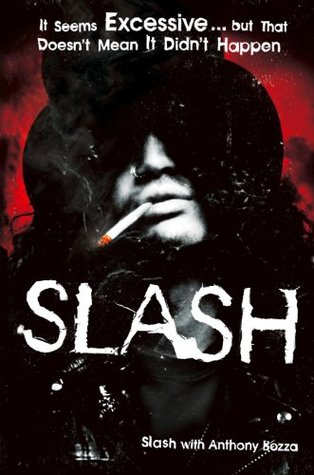More on this book
Community
Kindle Notes & Highlights
When I was finally hospitalized, I was told I had six weeks to live. It’s been six years since then and this piece of machinery has saved my life more than a few times.
being a rock star is the intersection of who you are and who you want to be.
I owe it all to Steven Adler—he did it. He is the reason that I play guitar.
playing Van Halen on the jukebox over and over. It was a ritual by then: Steven had played their first record for me a few months before. It was one of those moments where a new body of music totally overwhelmed me.
Steven had concluded that there were only three bands that mattered in rock and roll: Kiss, Boston, and Queen. Steven paid tribute to them every day,
The receptionist introduced me to one of the teachers, a guy named Robert Wolin.
asked my grandmother for help and she gave me an old flamenco guitar with one nylon string on it
was a used book I found in a guitar store bargain bin called How to Play Rock Guitar.
was a very cheap Les Paul copy made by a company called Memphis Guitars.
I would start with a band’s live album, because I believe that is the only way to determine whether or not any band is worth your attention.
Aerosmith’s Rocks
Imitation should remain a stepping stone for a player to find his or her own voice, but it must never become his or her voice: no one should emulate their heroes to the point of note-for-note mimicry. Guitar is too personal of an expression for that; it should be exactly what it is—a singular extension of the player.
One day Seymour looked at me and bestowed upon me the nickname that resonated with him more than my proper name ever did.
“Hey, Slash, where ya going? Where ya going, Slash? Huh?”
But through the static din, way in the background, I heard something intriguing, that I believed to be their singer’s voice. It was hard to make out and his squeal was so high-pitched that I thought it might be a technical flaw in the tape. It sounded like the squeak that a cassette makes just before the tape snaps—except it was in key.
And more important, it expressly stated that “no beards or mustaches” need apply.
Shredding was not my forte—I could play fast, but I valued classic rock-and-roll, Chuck Berry–style playing over heavy metal showboating.
I’d been hauled in for a six-year-old jaywalking ticket.
To this day, I still do it; rather than doing obvious “exercises,” I invent runs of my own design that both loosen up my fingers and keep my ears engaged, because if practicing doesn’t sound good, why bother with it at all.
“Where do we go?” Axl said, more to himself than the rest of us. “Where do we go now?…Where do we go?”
It got to the point, in our drug-fueled creative zone, that we started seriously entertaining the idea of my joining Megadeth.
it was an amazing flame-top 1959 Les Paul replica with no pick guard, and two Seymour Duncan pickups.
I’ve learned that it is essential for everybody to be present at all times
the biggest catalyst to the demise of the band was the lack of communication among the members.
Axl scowled. “There’s no way Steven gets twenty percent, the same as I do. Uh-uh,” he said. “I want twenty-five percent and Steven gets fifteen. He’s a drummer. He doesn’t contribute to the writing as equally as the rest of us.” That was the compromise we agreed to: Axl got 25 percent; me, Izzy, and Duff 20 percent; and Steven 15 percent. I think Steven was permanently scarred by that.
AFTER WEMBLEY, WE GOT BACK TO L.A. and shot the video for “Don’t Cry,” in which Dizzy Reed is wearing a “Where’s Izzy?” T-shirt.
It all went down in Montreal, on August 8, 1992. Metallica went on, and midway through their set, James Hetfield caught on fire when a pyrotechnic malfunctioned.
collapsed like a rag doll in the hallway …I blacked out, and my heart stopped for eight minutes, or so I was told.
BY THEN ALL “BAND” DECISIONS WERE being made by Axl and Doug Goldstein. Duff and I and the other members were informed of what they’d decided by phone calls and faxes—Guns N’ Roses had officially become a dictatorship.
Axl sent a letter on August 31, 1995, saying that he was leaving the band and taking the name with him under the terms of the contract.


